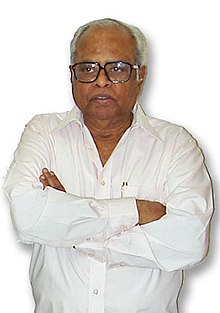
K. Balachander is an Indian film director, screenwriter and producer who works mainly in the Tamil film industry. He is well known for his distinct film-making style often dealing with interpersonal relationships and themes of social relevance.
Contents
- Civilian honors
- National Film Awards
- Filmfare Awards
- Filmfare Awards South
- Government of Tamil Nadu
- Honorary doctorate
- Tamil Nadu State Film Awards
- Nandi Awards
- Santhome Awards
- ANR National Award
- Cine Technicians Association Awards
- Other awards
- Notes
- References
Starting his career as a playwright, he made his cinematic debut as a dialog writer for Dheiva Thaai in 1964. [1] The following year he made his directional debut through Neer Kumizhi a film based on his own play. He secured his first National Film Award for Iru Kodugal , a family drama film released in 1969. His 1975 film Apoorva Raagangal won the award for the Best Feature Film in Tamil. The 1981 Tamil film Thanneer Thanneer that dealt with social issues such as water scarcity and political corruption fetched him the National Film Award for Best Screenplay and the Best Regional Film award. [1] He started his own production house in 1981 and named it Kavithalayaa Productions which produced several of his award-winning films like Achamillai Achamillai and Sindhu Bhairavi. His three films were included in CNN-IBNs List of the 100 Greatest Indian Films of All Time - Maro Charitra, Ek Duuje ke liye and Thanneer Thanneer. He also made forays into Telugu cinema, Hindi cinema and Kannada cinema. [1] His Maro Charitra and its Hindi remake Ek Duuje Ke Liye were huge box-office success and received critical acclaim. [1] For Ek Duuje Ke Liye he received three Filmfare nominations—Best Story, Best Screenplay and Best Director—eventually winning the award for the Best Screenplay. The film was highly responsible in catapulting Balachander to national acclaim. [1] Rudraveena fetched him the Nargis Dutt Award for Best Feature Film on National Integration in 1988. Four years later Roja , a Kavithaalaya production won the same award.
As of 2013, Balachander has directed over 80 films and has worked in more than 100 films either as director or a screenwriter. In 1987 he was honoured with the Padma Shri, India's fourth highest civilian honour. He has won nine National Film Awards and multiple Filmfare Awards. Balachander is also a recipient of various state awards like the Tamil Nadu State Film Awards and the Nandi Awards, instituted by the Government of Andhra Pradesh. In 2010 the Dadasaheb Phalke Award was bestowed upon him for his contributions to Indian cinema; he was the second personality and the first director from Tamil cinema to receive the award. [1] [2] The following year he was awarded with the ANR National Award by the Government of Andhra Pradesh.